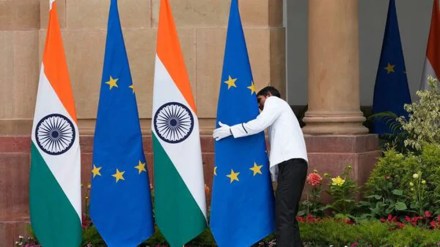India and the European Union (EU) will get back to the negotiating table in Brussels on Monday for the 14th round of talks on their Free Trade Agreement (FTA) for the last-lap push to conclude it before the December 2025 deadline.
Officials from both sides have held meetings almost every second month since the deadline was announced. The last round, the 13th since the negotiations began in July 2022, was held from September 8 to September 12.
During that round the EU trade commissioner Maros Sefcovic and the agriculture commissioner Christophe Hensen were also in New Delhi to guide the negotiations and break any deadlock that would have arisen.
“Their high level interactions with Indian authorities were useful to understand each sides position but did not allow them to make sufficient progress in sensitive areas such as automobiles and agriculture products,” the EU’s report on the round stated.
Stalled progress in sensitive sectors
Speaking at an event after the 13th round EU’s ambassador to India Herve Delphin said that the round was a missed opportunity to achieve some breakthrough in the negotiations.
The EU is pushing India to slash steep import duties on automobiles—ranging from 60% to 100% depending on vehicle size—as part of ongoing trade negotiations. With additional levies such as cesses and other charges, the effective tax on imported cars can reach as high as 160%. Brussels is also seeking broader market access for agricultural products, including European wines, as it looks to deepen trade ties with the world’s most populous country.
India’s demands in the negotiations is duty free access to its labour intensive imports and emerging sectors like auto, electronics. Another concern for New Delhi in the negotiations is the imposition of carbon tax by the EU on imports of steel, aluminium, cement and fertilisers from January 26.
India’s core demands and CBAM concerns
The tax imposed under the Carbon Border Adjustment Mechanism (CBAM) could put another barrier to India’s exports while tariff barriers are brought down further. Already India’s exports to EU of steel and aluminium have fallen as smaller companies do not want to go through the trouble of reporting carbon emission at the production stage of their products. Carbon reporting started in late 2024 before the tax was imposed.
The FTA covers 23 policy areas or chapters, including trade in goods, trade in services, investment, sanitary and phytosanitary measures, technical barriers to trade, trade remedies, rules of origin, customs and trade facilitation, competition, trade defence, government procurement, dispute settlement, intellectual property rights, geographical indications, and sustainable development.
